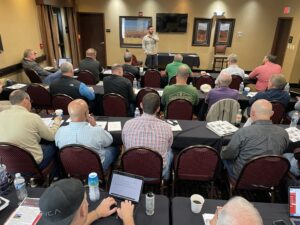
NASHVILLE, Tenn. (BP)–A New York Times column comparing the theme of the “Left Behind” book series to ethnic cleansing has sparked a reaction by two Southern Baptist professors.
In a July 17 column, The Times’ Nicholas Kristof criticized the belief that Christ someday would judge non-believers and cast them into hell. Kristof said his column was triggered by the popularity of the latest book in the “Left Behind” series — “Glorious Appearing” — released earlier this year.
“It’s disconcerting to find ethnic cleansing celebrated as the height of piety,” Kristof wrote. “If a Muslim were to write an Islamic version of ‘Glorious Appearing’ and publish it in Saudi Arabia, jubilantly describing a massacre of millions of non-Muslims by God, we would have a fit.
“We have quite properly linked the fundamentalist religious tracts of Islam with the intolerance they nurture, and it’s time to remove the motes from our own eyes.”
Americans, Kristof argued, “should be embarrassed when our best-selling books gleefully celebrate religious intolerance and violence against infidels.”
Two Southern Baptist professors wrote Kristof, saying that the theme behind the Left Behind series — the final judgment — is part of traditional Christian beliefs.
“The idea that Jesus Christ will one day return to earth to separate the sheep from the goats may be objectionable in many ears, but this tenet is certainly not the invention of American Evangelicals,” wrote Denny Burk, professor of biblical studies at Criswell College in Dallas. “This expectation is nothing less than historic Christian faith. When you deride this aspect of our faith, you are not just criticizing American Evangelicals, but all Christians who cherish the teachings of Jesus.”
James M. Hamilton Jr., assistant professor of biblical studies at Southwestern Baptist Theological Seminary in Fort Worth, Texas, agreed. Hamilton said the “Left Behind” authors, Tim LaHaye and Jerry B. Jenkins, draw the major theme of their books directly from the Bible.
“Note well that the authors are not urging Christians to seek to bring about the final judgment by their own strength in the present,” Hamilton wrote. “No, the authors are merely giving their interpretation of what the Bible says about that final judgment. The Bible commands Christians to leave justice in the hands of God, who says, ‘it is mine to avenge, I will repay’ (Rom. 12:19).
“… Christians who hold this view believe that what Jesus will do at the end will be just and right. To object to this is to object either to the fact that Jesus has such authority, or to the standards by which he judges, or to the principle of justice.”
Burk, who also quoted Romans 12:19, took exception to Kristof’s parallel between the Left Behind series and Islamic “fundamentalist religious tracts.” Christians, Burk noted, believe it is their duty not to judge, but rather to call people to repentance.
“The Islamic Jihadists believe that God will carry out his retribution on his enemies through faithful Muslims,” Burk wrote. “This of course is the theological ground for Islamic extremist violence against ‘infidels.’ Evangelicals do not believe that their mission is to carry out God’s retribution upon His enemies. On the contrary, we believe that vengeance is His, not ours. God will deal out His judgments when and where He sees fit.”
Evangelicals, Burk said, “might die for our faith, but we don’t kill for it if we are to be faithful to our creed.”
In his column Kristof defended his criticism of religion, arguing that in the 1800s some Christians used the Bible to defend slavery. Like those Christians of the 19th century, Kristof said, the beliefs of today’s evangelicals also deserve to be critiqued.
Hamilton, though, countered by noting that Christianity was at the heart of the anti-slavery movement.
“[H]istory … shows that the abolitionist and civil rights movements were led by sincere, Bible believing Christians,” Hamilton wrote. “It is my impression that the hermeneutic adopted by the abolitionists and the civil rights activists is the interpretation of the Bible that has won the day.
“I don’t know any leader or group in modern evangelicalism (i.e., conservative Christianity) who would advocate racism, slavery, or bigotry based on an interpretation of the Bible. No, Christians repudiate racism, slavery, and bigotry. Further, history shows that religious liberty and genuine tolerance have flourished where Christianity has gone.”
Kristof’s assertion that the final judgment is a form of “ethnic cleansing” is erroneous, Burk argued.
“Evangelical Christian faith, of course, does not anticipate an ethnic cleansing at the end of time,” Burk wrote. “The basis by which the Lord makes distinctions in the final judgment is not racial but moral. Evangelicals believe that all those who are joined to Christ by faith will be spared, and all those who are not joined to him will not be spared, irrespective of one’s race.
“It is not fair for you to portray Evangelical piety as tantamount to bigotry and genocide. You may think that is what our faith leads to, but that is simply not what we believe. As a matter of fact, we believe that God has determined to gather to Himself worshippers from every race on the earth: ‘with your blood you purchased men for God from every tribe and language and people and nation. You have made them to be a kingdom and priests to serve our God, and they will reign on the earth’ (Revelation 5:9-10). We believe that God is glorified in the racial diversity of His people.”
–30–















